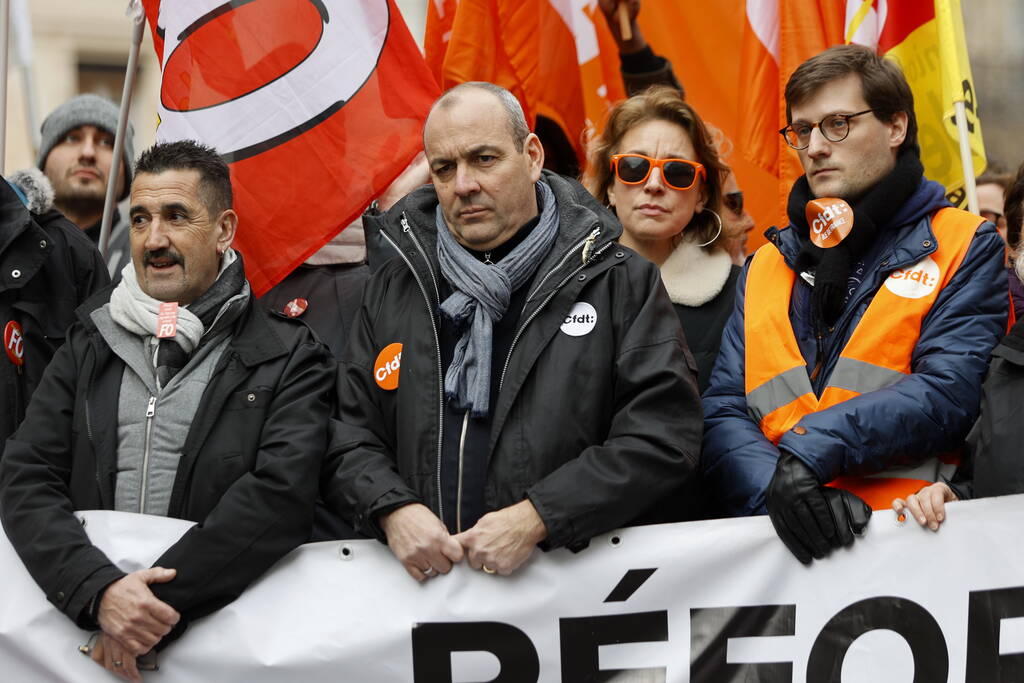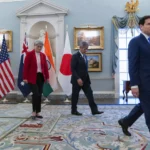
“Soon we will have to continue discussing and working together.” On March 18, two days after President Emmanuel Macron imposed the pension reform by decree, Labor Minister Olivier Dussopt was already trying to project himself on the continuation of the pension reform. Two and a half weeks later, while the Government continues trying to close the debate on the reform, this perspective continues to collide with the ongoing mobilization and the weakness of an isolated and highly unpopular Executive.
In this context, the objective of the meeting organized for this Wednesday April 5 with the trade unions is clear on the part of the government. Faced with the anger that has persisted and the phenomena of radicalization among the workers since the imposition of the reform by decree, it is a question of staging an attempt to resume the “social dialogue” and to try to advance, in particular with the CFDT (Confederation French Democratic Labor Party), to start preparing a future labor reform law. In short, finding a way out of the current crisis.
Regarding the possibility of withdrawing the pension reform, the Executive continues to be very clear: it is not under debate. On the contrary, as Olivier Véran, who held the Ministry of Health, recalls, it is even the “operational application” of the text, which “requires many debates and exchanges”, which could be on the agenda of the discussions. However, these statements are not enough to discourage the participation of the entire Intersindical.
Laurent Berger (leader of the CFDT) intends to “take advantage of the occasion” to reiterate his calls for a “pause” and “mediation”, while the CGT (General Confederation of Labor), Sud and Force Ouvrière want to reaffirm their demand for ” withdrawal” of the reform. Faced with pressure from the grassroots and the continued desire to push the government back, Sophie Binet, the new head of the CGT, threatened that the conversation “could be short” if the pension reform law was not withdrawn. The differences in slogans and positions do not hide the essence of the problem.
Beyond the break with the principle expressed up to now by the leaderships of the trade union centrals grouped in the Intersindical, that is, that the withdrawal of the pension reform was a prerequisite for any discussion, when going to Matignon (residence of the Prime Minister French) the union leaderships in fact sow, whatever they say, illusions as to the possibility of finding a way of compromise with President Macron. An even more scandalous position considering that the government has taken a new step in the repression of demonstrations and pickets.
The French Ministry of the Interior imposed the dissolution of organizations such as the Soulèvements de la Terre and the Défense Collective Rennaise, the assimilation of the denunciation of police violence to “intellectual terrorism”, the prohibition of demonstrations at large, the announcement this Tuesday of the launch of a commission of inquiry into the recent “illegal and violent demonstrations” by right-wing legislators linked to the government, show that with the repression unleashed by the police since the use of the decree to impose the pension reform, the government it seeks, more than ever, to criminalize social protest and prepare the ground for a new authoritarian offensive. A jump that is accompanied by new attacks against the right to strike among the sectors that have maintained them, seeking to break the current movement. This same Monday, the State announced new requisitions of strikers, seeking to force workers to return to their jobs, at the Total de Normandy refinery to avoid fuel shortages before the Easter holidays.
In this context it becomes clear that there is nothing to “discuss” with those who want to destroy social conquests, there is even less to discuss with those who maim protesters and break strikes to achieve it. Faced with the Macron government, the urgency must be to prepare the response, forming a bloc right now against the repression, the measures against the strikes, and build a relationship of forces to make the Executive yield, generalizing the strike for an indefinite period of time. This is an option that the leaderships of the union centrals grouped in the Intersindical continue refusing to take, while allowing the government a “way out.” The risk is not only losing the movement, but also opening the way to a violent counter-offensive against those who have been fighting for two months.
Source: www.laizquierdadiario.com

